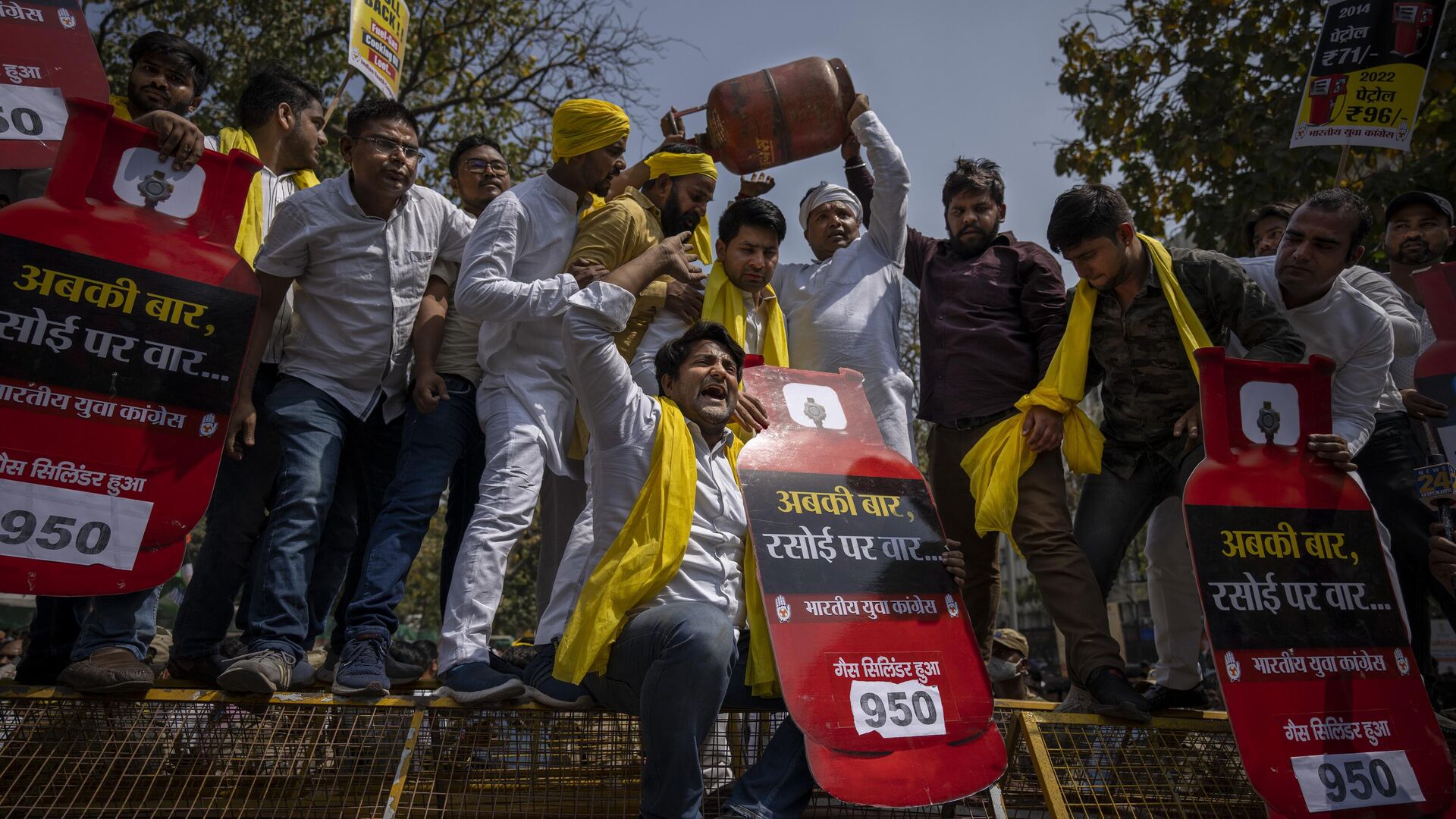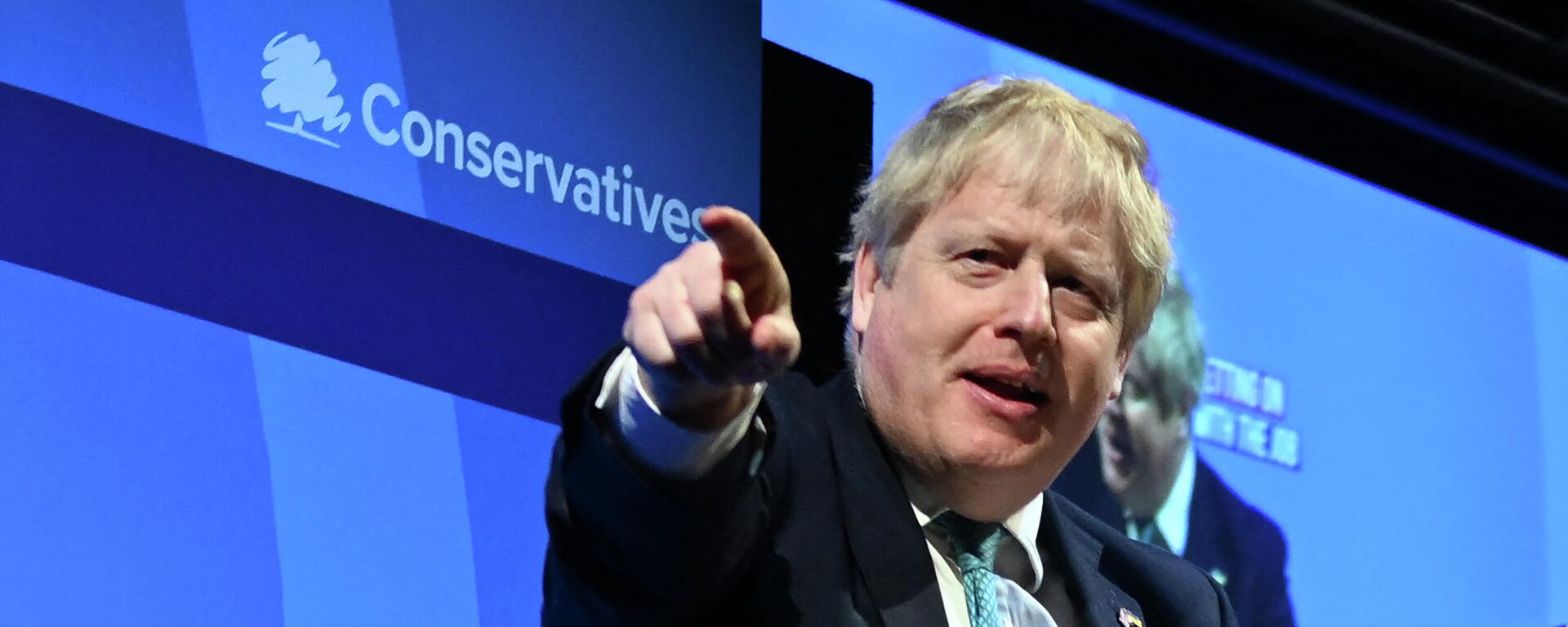https://sputnikglobe.com/20220418/expert-predicts-much-higher-inflation-as-india-reels-from-record-price-rise-due-to-ukraines-crisis-1094858088.html
Expert Predicts Much Higher Inflation as India Reels from Record Price Rise Due to Ukraine's Crisis
Expert Predicts Much Higher Inflation as India Reels from Record Price Rise Due to Ukraine's Crisis
Sputnik International
In an attempt to minimise the impact of rising commodity prices, the Indian government has taken a bold step on energy imports by rejecting Western demand to... 18.04.2022, Sputnik International
2022-04-18T14:49+0000
2022-04-18T14:49+0000
2023-03-05T11:22+0000
russia
economic crisis
us sanctions
narendra modi
ukraine
gas
sanctions
crude oil
inflation
https://cdn1.img.sputnikglobe.com/img/07e6/03/1a/1094216340_0:160:3073:1888_1920x0_80_0_0_a538f2e13ded35de1f165809397283d0.jpg
The government of India has blamed a significant disruption in the global supply chain due to Russia-Ukraine conflict for March's 14.55% wholesale price inflation index at the producer level.The annual wholesale inflation rate accelerated to a three-month high as firms grappled with rising input costs, resulting in higher prices for consumers at retail outlets.D.K. Mishra, a Delhi-based economist, says that only half or little more than half of the impact of rising input costs for products is reflected in the latest inflation data."We have not seen the full impact of the supply chain disruption triggered by the Russia-Ukraine conflict on the Indian economy. We will see more inflationary pressure in coming weeks," D. K. Mishra told Sputnik.March's figure was above the forecasts issued by financial institutions as fuel prices rose by a whopping 34.52% on the year, versus their 31.50% annual rise in February."The sectors importing goods or raw materials from Ukraine such as chemicals and edible oil will see a larger impact. However, we are exploring other markets to fill the shortfall," Mishra adds.The Reserve Bank of India (RBI) on 8 April revised the growth forecast and inflation outlook for the $3 trillion economy. It marked a rise in crude oil prices as "the biggest risk to India's economic prospects".Jaishankar said that India's total oil purchase from Russia in a month is probably less than what Europe does in an afternoon.Brent crude prices crossed $130 per barrel on 8 March and have hovered in the $100-120 range since mid-March.The expert says that earlier apprehensions about the sanctions also wean away as things are getting clearer now after discussions between Indian and other world leaders."There were apprehensions that European or the US may take strict action if New Delhi continues to trade with Russia. Rather, we see a more diplomatic approach by the west, or we can say they are not as aggressive as what we had predicted in the initial days of sanctions," Mishra points out.There are growing sentiments among some sections of the Indian society that the government does not prioritise inflation, as the ruling Bharatiya Janata Party keeps securing victory in elections in the country."We can not say that the government is not concerned about inflation as it is securing electoral victories. We have seen steps were taken by the Reserve Bank of India in the past that are helping to curb price rise in fact," the economist says.The RBI slashed the economy's growth forecast to 7.2%, down from February's projection of 7.8%. The central bank underlined to move away from its ultra-loose monetary policy and prioritised fighting inflation."You must understand that RBI can not squeeze money by raising repo rates. The government wants a policy that ensures enough money supply to push economic growth. But yes, it has side-effects, which we are seeing in terms of high commodity prices which have cascading effects as well," Mishra concludes.The Indian economy had witnessed an 8.9% growth rate in 2021-22 (ending March 2022), above its pre-pandemic (2019-20) level by just 1.8%.
https://sputnikglobe.com/20220414/how-bojos-economic-policy-anti-russia-sanctions--ukraine-bravado-accelerate-uk-inflation-crisis-1094767350.html
ukraine
Sputnik International
feedback@sputniknews.com
+74956456601
MIA „Rosiya Segodnya“
2022
Rishikesh Kumar
https://cdn1.img.sputnikglobe.com/img/07e4/08/04/1080055820_0:0:388:389_100x100_80_0_0_40018ee210946d65d49ffba4f4c008e1.jpg
Rishikesh Kumar
https://cdn1.img.sputnikglobe.com/img/07e4/08/04/1080055820_0:0:388:389_100x100_80_0_0_40018ee210946d65d49ffba4f4c008e1.jpg
News
en_EN
Sputnik International
feedback@sputniknews.com
+74956456601
MIA „Rosiya Segodnya“
Sputnik International
feedback@sputniknews.com
+74956456601
MIA „Rosiya Segodnya“
Rishikesh Kumar
https://cdn1.img.sputnikglobe.com/img/07e4/08/04/1080055820_0:0:388:389_100x100_80_0_0_40018ee210946d65d49ffba4f4c008e1.jpg
economic crisis, us sanctions, narendra modi, ukraine, gas, sanctions, crude oil, inflation
economic crisis, us sanctions, narendra modi, ukraine, gas, sanctions, crude oil, inflation
Expert Predicts Much Higher Inflation as India Reels from Record Price Rise Due to Ukraine's Crisis
14:49 GMT 18.04.2022 (Updated: 11:22 GMT 05.03.2023) In an attempt to minimise the impact of rising commodity prices, the Indian government has taken a bold step on energy imports by rejecting Western demand to shun Russian oil, which is available at a discounted rate, amid the Ukrainian crisis.
The government of India has blamed a significant disruption in the global supply chain due to Russia-Ukraine conflict for March's 14.55% wholesale price inflation index at the producer level.
The annual wholesale inflation rate accelerated to a three-month high as firms grappled with rising input costs, resulting in higher prices for consumers at retail outlets.
"The high rate of inflation in March, 2022 is primarily due to rise in prices of crude petroleum and natural gas, mineral oils, basic metals, etc. owing to disruption in global supply chain caused by Russia-Ukraine conflict," India's Ministry of Commerce said.
D.K. Mishra, a Delhi-based economist, says that only half or little more than half of the impact of rising input costs for products is reflected in the latest inflation data.
"We have not seen the full impact of the supply chain disruption triggered by the Russia-Ukraine conflict on the Indian economy. We will see more inflationary pressure in coming weeks," D. K. Mishra told Sputnik.
March's figure was above the forecasts issued by financial institutions as fuel prices rose by a whopping 34.52% on the year, versus their 31.50% annual rise in February.
"The sectors importing goods or raw materials from Ukraine such as chemicals and edible oil will see a larger impact. However, we are exploring other markets to fill the shortfall," Mishra adds.
The Reserve Bank of India (RBI) on 8 April revised the growth forecast and inflation outlook for the $3 trillion economy. It marked a rise in crude oil prices as "the biggest risk to India's economic prospects".
"India has taken a very bold step against the western sanction on Russia. It underlined that it would not shun Russian oil purchases. The Indian government discusses ways to establish payment mechanisms such as rupee-ruble trade to avoid trade in dollars. So, I do not foresee any disruption in supply from the Russian side," the economist emphasised, referring to recent remarks by Indian Foreign Minister S. Jaishankar during the Washington trip.
Jaishankar said that
India's total oil purchase from Russia in a month is probably less than what Europe does in an afternoon.
Brent crude prices crossed $130 per barrel on 8 March and have hovered in the $100-120 range since mid-March.
The expert says that earlier apprehensions about the sanctions also wean away as things are getting clearer now after discussions between Indian and other world leaders.
"There were apprehensions that European or the US may take strict action if New Delhi continues to trade with Russia. Rather, we see a more diplomatic approach by the west, or we can say they are not as aggressive as what we had predicted in the
initial days of sanctions," Mishra points out.
There are growing sentiments among some sections of the Indian society that the government does not prioritise inflation, as the ruling Bharatiya Janata Party keeps securing victory in elections in the country.
"We can not say that the government is not concerned about inflation as it is securing electoral victories. We have seen steps were taken by the Reserve Bank of India in the past that are helping to curb price rise in fact," the economist says.
The RBI slashed the economy's growth forecast to 7.2%, down from February's projection of 7.8%. The central bank underlined to move away from its ultra-loose monetary policy and prioritised fighting inflation.
"You must understand that RBI can not squeeze money by raising repo rates. The government wants a policy that ensures enough money supply to push economic growth. But yes, it has side-effects, which we are seeing in terms of high commodity prices which have cascading effects as well," Mishra concludes.
The Indian economy had witnessed an 8.9% growth rate in 2021-22 (ending March 2022), above its pre-pandemic (2019-20) level by just 1.8%.






